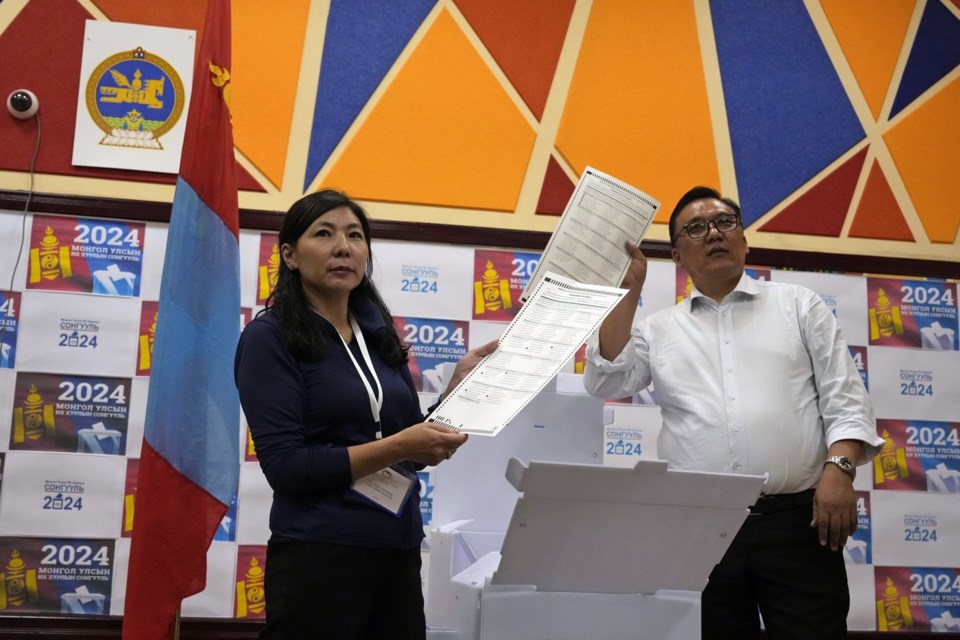The TT Chamber of Industry and Commerce (TT Chamber) is set to embark on a pivotal trade mission to Jamaica from June 25-29. This exciting venture...
Vous n'êtes pas connecté
- English
- Français
- عربي
- Español
- Deutsch
- Português
- русский язык
- Català
- Italiano
- Nederlands, Vlaams
- Norsk
- فارسی
- বাংলা
- اردو
- Azərbaycan dili
- Bahasa Indonesia
- Հայերեն
- Ελληνικά
- Bosanski jezik
- українська мова
- Íslenska
- Türkmen, Түркмен
- Türkçe
- Shqip
- Eesti keel
- magyar
- Қазақ тілі
- Kalaallisut ; kalaallit oqaasii
- Lietuvių kalba
- Latviešu valoda
- македонски јазик
- Монгол
- Bahasa Melayu ; بهاس ملايو
- ဗမာစာ
- Slovenščina
- тоҷикӣ ; toğikī ; تاجیکی
- ไทย
- O'zbek ; Ўзбек ; أۇزبېك
- Tiếng Việt
- ភាសាខ្មែរ
- རྫོང་ཁ
- Soomaaliga ; af Soomaali
Rubriques :
 Maroc - EURASIAREVIEW.COM - A la une - 27/Jun 16:38
Maroc - EURASIAREVIEW.COM - A la une - 27/Jun 16:38
How Mongolia Is Transforming Into A Beacon For Foreign Direct Investment In East Asia
By Darren G. Spinck Lord Cameron’s April 2024 visit to Mongolia and Central Asia demonstrates the growing importance that London places on protecting and promoting British interests in the Indo-Pacific. Mongolia’s strategic location and Ulaanbaatar’s significant democratisation and anti-corruption efforts make the country an ideal partner for collaboration with the United Kingdom as London builds upon its strategy to shape economic and cooperative ties in the region. UK policymakers seeking to promote more transparent business and to strengthen governance and rule of law throughout the region can highlight the Mongolian Government’s determined anti-corruption reforms aimed at whistle-blower protection, asset recovery and prosecuting corrupt officials. With its vast territory and resources, Mongolia also holds immense potential for helping lead broader regional efforts toward democratisation, as illustrated by The Economist Intelligence Unit’s 2023 Democracy Index, which ranks Mongolia in the top 35% of all countries for its global efforts, including electoral process and pluralism, functioning of government, political participation, political culture and civil liberties. According to Freedom House, Mongolia ranks alongside the world’s top democracies for its electoral process, political pluralism and participation, freedom of expression and belief, and associational and organisational rights, while in its most recent annual Index of Economic Freedom, the Heritage Foundation praised Ulaanbaatar for its regulatory efficiency and efforts to attract foreign direct investment (FDI) through market liberalisation. Landlocked between Russia to its north and China to its south, Mongolia has long demonstrated its commitment to deepening economic and strategic ties beyond its borders. Despite Ulaanbaatar’s commendable reform efforts, however, Mongolia, and other countries most in need of FDI, have seen falls in foreign investment since the Covid-19 pandemic, according to the United Nations Conference on Trade and Development (UNCTAD), due in large part to rising public debt and economic uncertainty from the world’s most industrialised democracies. Mongolia did successfully enter the international debt market in 2023, following the Covid-19 pandemic, with the successful issuance of two $650 million and $350 million five-year bonds, an indication that Mongolia’s economic recovery from the pandemic was not slowed, as many other Indo-Pacific regional economies were, due to policies outlined in the Government’s “New Recovery Policy”. Post-pandemic, Mongolia’s long-term development will be guided by “Vision 2050”, a strategy focused on social development and economic growth. If London intends to solidify its role as a long-term partner with Ulaanbaatar, the UK and its partners must better compete with investment into Mongolia from the People’s Republic of China, which has led to the creation of over 100,000 jobs and $2 billion in tax revenue, including past development finance for planned road, rail and energy infrastructure links between the two countries and their neighbour Russia. The UK should incentivise the private sector to invest in Mongolia and, through British International Investment (BII), its development finance institution, bridge the regional infrastructure investment gap. The UK and Mongolia can best begin to strengthen their trade and investment ties through a Partnership and Cooperation Agreement which would allow both parties to seek greater market access for goods and services; better provide UK goods with intellectual property rights protections; encourage the flow of investments through the easing of administrative hurdles which slow investment flows; and provide transparent, non-discriminatory rules for investors and cooperation on sub-regional and regional cooperation agreements. As Mongolia strives to diversify its investment and trade partners, it offers unique opportunities for the UK to deepen its engagement in the region. With its abundance of rare earth elements and other valuable minerals, Mongolia presents avenues for cooperation in resource development and securing critical supply chains. UK policymakers should prioritise determining which infrastructure is needed to further UK economic security objectives vis-à-vis Mongolia, as Mongolia is currently overly dependent upon China’s Port of Tianjin for the export of its goods. This will require building new roads and railways to potential mining sites to handle heavy machinery and to export the rare earths and minerals. While Mongolia’s strategic positioning between China and Russia will necessitate a nuanced approach to the UK’s regional partnerships, it also offers opportunities for the UK and US to help Mongolia better mitigate its strategic risks associated with overdependence on non-democratic governments for its commercial ties. In addition to investment opportunities in Mongolia’s rare earth elements and mineral sectors and infrastructure development finance, other industries which should attract foreign direct investment interest from the West include renewable energy, agriculture, digitisation and the expansion of American and British fast food/convenience store franchises. It is crucial for UK policymakers to recognise Mongolia’s role as a vibrant democracy in a largely non-democratic region and to seize the opportunities presented by its democratic and economic reforms. By strengthening relations with Ulaanbaatar and supporting its efforts toward democratisation, anti-corruption and economic diversification, the UK can contribute to fostering stability, prosperity and good governance in Mongolia and the broader region. About the author: Darren G. Spinck is an Associate Research Fellow at the Henry Jackson Society’s Centre for Indo-Pacific Studies. He is also managing partner of Washington Consulting Solutions, a US-based public affairs agency, where he focuses on policy analysis, strategic message development and public advocacy programs. Read the full Report here.
Articles similaires
Rutte To Lead NATO Revival: A More Secure Europe – OpEd
The appointment of Mark Rutte as NATO Secretary General in 2024 is significant and represents a pivotal moment for European security. Rutte's...
Mongolia's governing party wins only a slim majority in parliamentary election, early results show
ULAANBAATAR, Mongolia (AP) — Mongolia's governing party won parliamentary elections Friday but by only a slim margin as the opposition made major...
Mongolia's governing party wins only a slim majority in parliamentary election, early results show
ULAANBAATAR, Mongolia (AP) — Mongolia's governing party won parliamentary elections Friday but by only a slim margin as the opposition made major...
The Impact Of China’s Digital Silk Road On The Digital Domain Of The Philippines – Analysis
By Julio S. Amador III and Deryk Matthew N. Baladjay One of the first policy directives given by President Ferdinand Marcos Jr. to his government...
PM’s attendance at WEF meeting brings opportunities for Việt Nam’s economic integration: Ambassador
The Vietnamese government leader has been invited to the event for two consecutive years demonstrates the appreciation of the WEF and the...
A Nuclear Calculus? The Security Risks And Diplomatic Challenges Of Russia-North Korea Alliance – OpEd
In June 2024 the formalisation of a strategic partnership between Russia and North Korea emerged as a pivotal development far with far-reaching...
Building On Foundations: Kishida’s Premiership Post-Abe – Analysis
By Pratnashree Basu In the recent Okinawa prefectural assembly election held on 16 June 2024, the ruling camp, including the Constitutional...
How The US Can Beat The Kremlin In Moldova – Analysis
By Peter Rough and Luke Coffey (FPRI) -- Russia’s large-scale invasion of Ukraine was a seismic event for the Republic of Moldova. The war...
Pakistan’s Quest For Regional Peace Amidst Hostile Neighbors – OpEd
Pakistan has consistently pursued a policy of peaceful coexistence towards its South Asian neighbors, aiming to foster a stable and cooperative...
Les derniers communiqués
-
Adobe Brings Conversational AI to Trillions of PDFs with the New AI Assistant in Reader and Acrobat
Adobe - 21/02/2024
-
Laura Frigenti takes the Helm as Chief Executive Officer of the Global Partnership for Education
Global Partnership for Education - 05/12/2022


